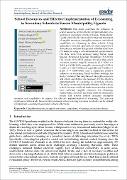School resources and effective implementation of e-Learning in secondary schools in Kasese Municipality, Uganda

View/
Date
2024-01-30Author
Tobia, Karaha Kyomuhendo
Wilson, Mugizi
Joseph, Rwothumio
Mark, Micheal Waiswa
Metadata
Show full item recordAbstract
This study examined the influence of school resources on the effective implementation of e-learning in secondary schools in Kasese Municipality, Uganda. Specifically, the study investigated the impact of tangible resources, intangible resources, and school capabilities on e-learning in these schools. Using quantitative research approach, the study employed a correlational research design and collected data from 170 teachers using a self-administered questionnaire. The data were then analysed using Partial Least Squares Structural Equation Modelling (PLS-SEM). The results of the SEM analysis revealed that school resources, namely tangible resources (? = 0.266, t = 3.612, p = 0.000<0.05), intangible resources (? = 0.234, t = 2.351, p = 0.019<0.05) and capabilities (? = 0.456, t = 5.129, p = 0.000<0.05), had a significant positive influence on e-learning. Based on these findings, the study concluded that tangible and intangible resources and school capabilities are necessary for the effective implementation of e-learning in secondary schools. The study recommends that the Ministry of Education, school directors, and head teachers ensure that schools have sufficient tangible resources for e-learning. Additionally, directors and head teachers should also ensure that schools possess adequate intangible resources and capabilities to support the effective implementation of e-learning. The practical significance of this study lies in its demonstration of how existing resources in schools can be utilised to implement e-learning in secondary schools effectively.
